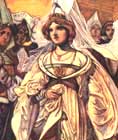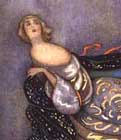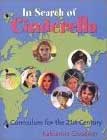
Cinderella:
345 Variants
by Marian
Roalfe Cox
SurLaLune's
Cinderella Area
SurLaLune Fairy Tales Main Page
218
Grimm, Household Tales. Translated by Margaret Hunt. London, 1884. Vol. ii, pp. 282-291. Tale No. 179. (From a story by Andreas Schumacher, in Vienna.)
"THE GOOSE-GIRL AT THE WELL."
[You can read Hunt's translation of The Goose-Girl at the Well on SurLaLune.]
ABSTRACT
King Lear judgment--Loving like salt--Outcast heroine-- Sack of salt bound on heroine's back. Her tears strew the road with pearls--Father repents judgment; makes vain search for heroine--Old-woman aid--Heroine disguise (old-woman skin)-- Menial heroine--Nobleman carries old woman's burden; is rewarded with emerald book containing pearl, which he after wards gives to heroine's mother, who, reminded thereby at daughter's tears, faints--Heroine quest--Heroine discovered (heroine doffs skin to bathe at well by moonlight)--Flight--Pursuit by nobleman, who misses heroine, but falls in with heroine's parents. Together they reach house of old woman, who, after reproving parents, presents heroine clad as princess--Old woman has collected heroine's tears; gives them as re for services as goose girl. Transforms her house into castle for heroine.
TABULATION
(1) King asks daughters how much they love him. Eldest says, "As much as sweetest sugar"; second, "As my prettiest dress." Youngest daughter says, "I love my father like salt." King is furious, and says, "Your love shall be repaid with salt." Dividing kingdom between two elder daughters he binds sack of salt on back of youngest, and bids two servants lead her into forest. Her tears strew the road with pearls.1 King afterwards repents, but searches for her in vain.-- (2) Heroine is found by old woman, who takes her as gooseherd and gives her old woman's skin as disguise.-- (3) One day a nobleman wandering in forest sees old woman cutting grass for geese, and wonders how she can carry such a load as well as two baskets of apples and pears. Takes compassion on her, and offers to carry bundle of grass, but she loads him wills baskets as well, and he is overburdened. Her taunts make him persevere, but he is quite exhausted after toiling up hill, while she seems to grow more nimble, and finally springs on top of bundle, and goads him on with stinging-nettles. He nearly drops on reaching old woman's house. Geese run to meet her, and behind them follows a hideous old wench who addresses old woman as mother, and hears how gentleman has borne her burden. Old woman bids him rest.-- (4) He sleeps under apple-tree till she awakens him, says he cannot stay longer, and gives him little book cut out of single emerald which will bring him good fortune. He thanks her, and sets off, wandering three days before he can get out of wilderness, he then reaches a royal palace, and lays emerald-book at feet of queen. She opens it, and falls as though dead. He is seized by king's servants to be led to prison, but queen revives and orders his release, then discloses to him privately that book contains pearls just like those that used to fall from her youngest daughter's eyes. Nobleman tells how he came by pearl, and king and queen resolve to seek out old woman and hear news of daughter.-- (5) Heroine goes to well by moonlight to wash herself. Takes off skin, dips it in water, and lays it on grass to dry. Meanwhile she sits weeping, and her golden hair falls round her like mantle. She hears rustling of boughs in a neighbouring tree, and instantly slips into skin and vanishes. Trembling with alarm, she reaches threshold, where old woman meets her, and says she knows what has happened, that the time is up and they can no longer remain together. Heroine is dismayed, fearing to be cast off. Old woman sets to work to sweep house, and bids heroine go to her room, take off skin, and put on silk gown in which old woman found her, then wait till she is called. Meanwhile nobleman has wandered away from king and queen, and is resting for the night in a tree, when he sees heroine take off skin and bathe. When she is startled by noise of branches and flies off, he rushes in pursuit, but misses her and falls in with king and queen-- (6) They reach house together, and find old woman spinning. She bids them enter, and, after reproving parents for unjust expulsion of daughter, calls heroine, who appears clad like princess. King bemoans having given away kingdom and having nothing for youngest daughter. Old woman says the tears she has wept fur her parents are precious pearls. These and the little house are heroine's reward for her services as goose-girl. Saying which, old woman vanishes, and the house is suddenly transformed into palace.
NOTES
Note 30
(P. 226.) The pearl is made, in the myth, to spring out of Venus's tear. Eve's tears, like Frigg's tears, are pearls in water, nuggets of gold on land (see Corpus Poet. Boreale, i, cvi). Wäinämoinen's tears are pearls (see Kalewala, Rune 22). So are the tears of the Chinese merman (see F.-L. Journal, vii, 319). According to Sicilian popular tradition, the tears of unbaptised children turn to pearls when poured into the sea by the angel who has collected them (Pitré, F.-L. J., vii, 326).
In a tale from the foot of the Himalayas, published in Russian by Minaef (No. 33), a princess weeps pearls (she also laughs rubies, see note 51). Cf. Cavallius, p. 142; Chodzko, p. 315; Glinski, iii, 97; Karajich, No. 35; Stokes, No. 2.
There are tears of gold in the story of Mardol (see Arnason,
p. 437, and Maurer, Mod. Icelandic Pop. Tales) and in the story
of the Jealous Sisters (1001 Nights). Cf. Gerle, Volksm. der
Bohmen, No. 5; Spitta-Bey, No. 11; Schiefner, No. 12; and see Rydberg,
Teut. Myth, p. 564. Not only do Freyja's tears turn into drops
of gold (Grimm, Teut. Myth., 1218), but a Greek myth makes [Greek name]
arise from the tears of Phaethon's sisters, daughters of the Sun.
Return to place in text.
Cox, Marian Roalfe. Cinderella: Three Hundred and Forty-five Variants of Cinderella, Catskin, and Cap O' Rushes, abstracted and tabulated. London: David Nutt for the Folklore Society, 1893.
While the original text of this book is out of copyright, the special formatting and compilation available on SurLaLune Fairy Tales is copyrighted. Be aware that while the original content has been honored, page numbering, footnote numbering, redesigned charts, links, and other aspects are unique to this site's version of the text. Use at your own risk. For private and fair use educational purposes only.
©Heidi
Anne Heiner, SurLaLune Fairy Tales
E-mail: surlalune@aol.com
Page last updated February 1, 2006
www.surlalunefairytales.com










